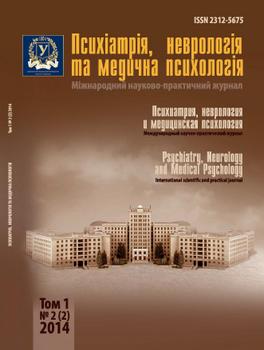Characteristics of Addictive Status in Women with Disorders in Gender-Role Behavior of Non-Transsexual Type And Alcohol Addiction
Abstract
Eighty eight (88) women OF 18–27 years old (average age 22.50 years) with alcohol addiction and deviations of gender-role behavior (treatment group) in-patient patients in Regional Clinical Psychiatric Hospital No.3 and Kharkov Regional Clinical Narcological Hospital in 2012–2014 as well as 30 healthy women (average age 30,00 years) residents of Kharkov and Kharkov region without signs of addiction and deviations of gender-role behavior (reference group) have been studied. Addicted women with genderrole deviations of non-transsexual behavior were found to have complex addictive profi le that can be shown by: dominant pathologic (nosologic) pattern of alcohol consumption; presence of two prenosological patterns of consumption of psychoactive substances (PAS) of diff erent hazardous level (‘relatively safe’ and ‘hazardous’) alone with nosologic patterns; presence of two types of PAS consumption (mono-substance and poly-substance); consumption of two illegal PAS (cannabinoids). Such factors as earlier beginning of alcohol consumption, shorter period of inebriety, earlier age of the fi rst degree of alcohol addiction, shorter duration of stages of disorder, higher initial tolerability and its increase, increased incidence of altered state of alcohol intoxication starting from the alcoholism II degree in women with gender-role transformation compared to hyperrole women allow considering clinical course of alcohol addiction in women with gender-role transformation as more malignant.
Downloads
References
Альтшулер В. Б. Женский алкоголизм [Текст] / В. Б. Альтшулер // Лекции по наркологии / под ред. Н. Н. Иванца. – М.: Нолидж, 2000. – С. 116–134.
Короленко Ц. П. Формы женской аддиктивной зависимости в постмодернисткой культуре [Текст] / Ц. П. Короленко, Т. А. Шпикс // Обозрение психиатрии и медицинской психологии. – 2012. – No 1. – С. 7–12.
Stewart S. H. Women, girls, and alcohol [Text] / S. H. Stewart, D. Gavric, Р. Collins // Brady K. T., Back S. E., Greenfi eld S., eds. Women and addiction: a comprehensive handbook. – New York, NY: Guilford Press, 2009 – P. 124–148.
Шайдукова Л. К. Конституционально-психо-логические особенности нарушений полоролевого поведения женщин, злоупотребляющих алкоголем [Текст] / Л. К. Шайдукова // Практическая медицина. – 2012. – No 2. – С. 118-121.
Овчинников С. В. Клинико-психологические особенности алкоголизма у молодых женщин с девиантным поведением [Текст] / С. В. Овчинников [и др.] // Материалы научно-практической конференции врачей-психиатров Московской области «Вопросы социальной и клинической психиатрии и нарколо-гии». – М.: 2006. – С. 269–270.
Овчинников С. В. Алкоголизм молодых женщин с девиантным поведением (клинико-психологический, социальный и терапевтический аспекты) [Текст] / С. В. Овчинников, Б. Д. Цыганков, С. А. Шамов, И. В. Старкова // Клиническая наркология. – 2008. – No 3. – С. 67–72.
Ураков И. Т. Возрастные аспекты начального этапа формирования женского алкоголизма [Текст] / И. Т. Ураков, И. Б. Власова // Клинические аспекты алкоголизма в подростковом возрасте. – М., 1982. – С. 51–53.
Иванец Н. Н., Взаимосвязь показателей прогредиентности алкоголизма с некоторыми преморбидными факторами [Текст] / Н. Н. Иванец, А. Л. Игонин // Журнал невропатологии и психиатрии. – 1983. – Вып. 8. – С. 1222–1228.
Иовчук Н. М. Детская социальная психиатрия для непсихиатров [Текст] / Н. М. Иовчук, А. А. Северный, Н. Б. Морозова. – СПб.: Питер, 2008. – 416 с.
Воронов Б. В. Детская и подростковая психиатрия [Текст] / Б. В. Воронков. – СПб.: Наука и Техника, 2009. – 240 с.
Слободянюк Д. П. Медико-психологічні особливості формування залежної поведінки у молоді при соціальних фобіях [Текст] / Д. П. Слободянюк // Ме-дична наука – 2010: матеріали наук.-практ. конференції (Полтава, 16-17 грудня 2010). – Полтава, 2010. – С. 62–63.
Грошев И. В. Анализ современных исследований гендерно-половозрастных характеристик социофобических психических расстройств, детерминирующих поведенческие паттерны личности [Текст] / И. В. Грошев // Российский психиатрический жур-нал. – 2010. – No3. – С. 16–24.
Лаундес Л. (Leil Lowndes) С. С. С. (скрытые сексуальные сигналы) [Текст] / Л. Лаундес / пер. с англ. И. Ющенко, Д. Буков. – М.: Добрая книга, – 2003. – 304 с.
Матевосян С. Н. Половая дисфория (клинико-феноменологические особенности и лечебно-реабилитационные аспекты синдрома «отвергания пола») [Текст] / С. Н. Матевосян, Г. Е. Введенский. – М.: ООО «Медицинское информационное агенство», 2012. – 400 с.
Частная сексопатология: (Руководство для врачей) / под ред. Г. С. Васильченко – Т. 2. – М.: Медицина, 1983. – 352 с.
Кришталь В. В., Сексологія. Навчальний посібник [Текст] / В. В. Кришталь, Є. В. Кришталь, Т. В. Кришталь. – Х. Фоліо, 2008. – 990 с.
Карманное руководство к МКБ-10. Классификация психических и поведенческих расстройств (с глоссарием и исследовательскими диагностическими критериями) [Текст] / Сост. Дж. Купер; Под ред. Дж. Э. Купера; пер. с англ. Д. Полтавца. – К.: Сфера, 2001. – 416 с.
Метод комплексной оценки аддиктивного статуса индивида и популяции с помощью системы AUDIT–подобных тестов [Текст] / И. В. Линский, А. И. Минко, А. Ф. Артемчук [и др.] // Вісник психіатрії та психофармакотерапії. – 2009. – No2 (16). – С. 56–70.
Иванец Н. Н. Типология алкоголизма [Текст] / Н. Н. Иванец, Л. М. Савченко. – М.: Российский благотворительный фонд «НАН», 1996. – С. 20–34.
Copyright (c) 2014 Е. П. Архипенко

This work is licensed under a Creative Commons Attribution 4.0 International License.

